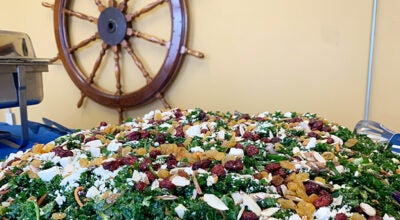STICKNEY COLUMN: Taking stock of life’s treasures
Published 12:01 am Wednesday, June 19, 2019
BEAUMONT — So here’s how you know you underestimated the quality of the evening lecturer: I pulled up to the Ward-McFaddin House 10 minutes early last week to find no parking spaces in the parking lot or on the street for a few blocks.
Then I entered the Visitor Center to be shuttled down the hall to an overflow room, where the lecture would be presented on a screen from elsewhere on the grounds. Bummer.
But Harry L. Rinker didn’t disappoint. The collectibles expert and professional appraiser delivered “Sell, Keep, or Toss?” in engaging fashion, presumably to people who know more about the topic than I do. He packed more than expertise into his lecture that night. He spoke the language of common sense.
I was there because my brother and soon, I, will clean out my father’s home in Massachusetts, where he’s lived for 59 years. Since my mother took ill a decade ago — Alzheimer’s disease — and died five years back, my father has lived amid the clutter that can accumulate when two single men — Dad and my youngest brother — live without paying requisite attention to stacks of stuff around them. It got so bad that when I’d visit there was nowhere to sit at the table — a pile of “file later” material rose up from every chair bottom in the house. No one would visit the house and Dad wondered why.
A couple of years back and at his sons’ behest, Dad called the local goodwill organization to the house. They carried away two bags filled with “donate” materials, he told me proudly. Not bad, in a house where there were two floors of obsolete and unused stuff.
So my goal in trekking north to the lecture was to gather Rinker’s wisdom in these advertised areas: passing treasured mementos to future generations; how to recognize valuable collections; finding reputable appraisers and auctioneers; getting a tax benefit from donated unwanted items; maximizing a profit on items sold.
What I carried out of the building was some sense of reality. Rinker, who is 77, spoke of the complexities of passing down items nowadays. What people accumulate can hold collector value, decorative value and re-use value. Or none of the above. If it’s none of the above, pitch it.
For starters, young people don’t want much of what their elders kept. That collection of Hummel figurines? Unless it contains some rarities, your children will say no thanks.
“With young kids today, it’s about use,” Rinker said. “They won’t take things to put in a china cabinet.”
That includes china. For 38 years, my wife and I have moved china — expensive to us — around the Southeast. It must be hand washed and our four children have all told us “no thanks” when we’ve offered it to them. If it isn’t dishwasher safe, Rinker says, no one wants it.
Rinker suggests the winnowing down process: What are 10 things you’d keep if you could only keep 10? What would you grab first in a fire? (The answer, he told us, was not his wife.) Those questions will help you make decisions.
Then, he said, there are the “10-foot monsters in the rooms”: books. Less then 10 percent are worth keeping, he said, the rest is junk. I’ve made hard decisions at every move when it comes to books. In Alabama, I donated a couple of hundred to the library book sale. Then, to my wife’s chagrin, I bought some back. (At a quarter each, they were a bargain.)
He suggested estate sales if, I suppose, you’ve got the stomach for listening to people insult your stuff. Better to get something than nothing. I remember standing in a carport in Northport, Alabama, where a college kid hemmed and hawed over buying our loveseat for $10. I think we gave it to her. After all, the kids had been sick on it.
That’s what my brother and sister-in-law are debating in New England this week: What to save, what to toss. There are family photos and papers; those matter, at least to the brothers. Other stuff, less so. There are closets filled with clothes no one will wear, furniture beyond repair. My brother, urging Dad to downsize once, told him when he dies we’d have a dumpster pulled up to the door and we’d start tossing. It might have been a cold remark, but prescient.
I’ve taken a single treasure from our home over the past 10 years: a coffee mug my great grandfather used. He died two months before I was born.
The rest, I’ll discard gladly. Nothing holds value forever, it seems.
Except for Dad.
•
Ken Stickney is editor of The Port Arthur News.





